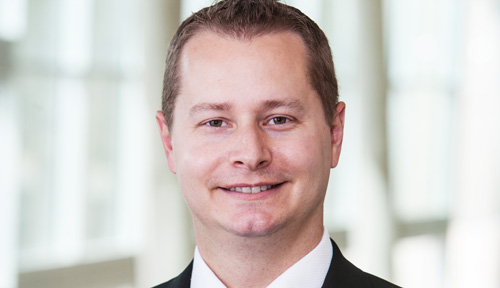A minimalist by nature, Jim Stimpson, Ph.D., occupies an office with no papers on the desk, no pictures on the walls.
Dr. Stimpson, director of the Center for Health Policy in the College of Public Health, prefers the stark, zen look. There’s nothing to distract his mind as it races to find innovative and sustainable interventions that will benefit public health.
Public health policies help keep the general population safe and healthy. Today we enjoy clean air, water and food, child vaccinations and seat belts thanks to public health policies that have become law.
Dr. Stimpson is a reflection of his office — he is precise, objective and logical in his thought process and in the way he conducts research. His vision is to build the center into a vital resource for decision makers who seek policy solutions that will improve the health of Nebraskans.
His work will help define the future and he’s well on his way.
Just over a year old, the center has released 14 reports that cover such wide ranging state and national public health policies as access to care, provider shortages and impaired driving laws.
But, most of his attention has been on the Affordable Care Act, or ACA — the new health care law of the land.
At age 39, Dr. Stimpson is perhaps one of the youngest in the state who understands the ACA.
He understands it because he’s read it, cover to cover — all nine titles, 487 sections and 418,779 words.
“It’s shorter than the Lord of the Rings Trilogy, but not as riveting,” he said.
President Barack Obama’s health care law is the most significant government expansion and regulatory overhaul of the U.S. health care system since the passage of Medicare and Medicaid in 1965.
The ACA is primarily administered through the U.S. Department of Health and Human Services, which establishes rules and guidelines. New developments occur daily and, to stay current, Dr. Stimpson spends at least one hour a day reading all the updates.
“Uninsured people now have limited options to access care and often wait until their illness is serious and then go to the emergency room. If they had insurance, then they would have better access to preventive and primary care, which would be less costly. Which is more efficient? Paying to provide citizens with basic insurance or paying higher private insurance premiums because of uncompensated care in the emergency room?”
To make the ACA more understandable, Dr. Stimpson posts updates and information on a blog. Posts range from the top five things you should know about health reform to a study that shows major disparities for Latinos and immigrants in Nebraska and Iowa.
“The most frustrating thing for me is all the misinformation and lack of information out there. But, what excites me about this law is that it begs a vast number of research questions.
I’m excited by the challenge of unraveling the complexity of the law and informing people about how it will impact them.”
